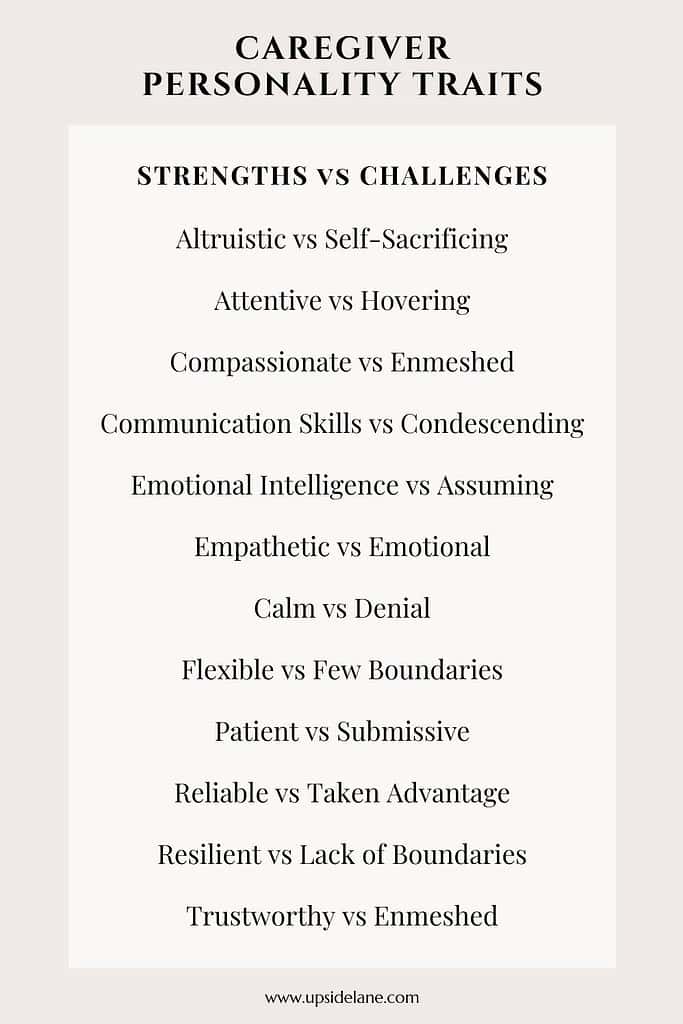Caregiver Personality Traits Beyond ESFJ The Caregiver
Caregiver personality traits are varied, and being an effective caregiver does not have to be tied to a specific personality type. Here we will explore caregiver personality types, offer insights for customizing approaches, and examine the various caregiver role options.

There is a difference between caregiver personality traits and the ESFJ personality type, which is often called “The Consul,” “The Provider,” or “The Caregiver.”
The ESFJ personality type is one of sixteen personality types based on Katherine Briggs and her daughter Isabel Myers’s personality test the Myers-Briggs Type Indicator (MBTI).
It is the second most common personality type, representing approximately 9% to 13% of the United States general population.
ESFJ stands for Extroversion, Sensing, Feeling, and Judging and while some caregivers may align with the ESFJ personality dimension, not all caregivers fit this category despite its common association.
I took the Myers-Briggs personality test and, although I have been a caregiver for most of my adult life, I do not fall into the ESFJ personality dimension.
The ESFJ The Caregiver Personality Type
According to the Myers & Briggs Foundation, people who associate with having the ESFJ personality have the following characteristics.
Warmhearted, conscientious, and cooperative. Want harmony in their environment, work with determination to establish it. Like to work with others to complete tasks accurately and on time. Loyal, follow through even in small matters. Notice what others need in their day-to-day lives and try to provide it. Want to be appreciated for who they are and for what they contribute.
ESFJ personality type is part of what Myers-Briggs calls “type preferences,” which are personality types we identify with more, and naturally lean toward. Personality types we prefer.
There are four preference pairs: Extraversion-Introversion (E-I), Sensing-Intuition (S-N), Thinking-Feeling (T-F), and Judging-Perceiving (J-P).
Decoding ESFJ: Understanding Personality Trait Preferences
The ESFJ Personality Trait is broken down into Extraversion, Sensing, Feeling, and Judging. Let’s look at these traits in more detail.
Extraversion versus Introversion (E-I)
This dimension describes how one manages their energy, whether they are energized by having time alone (introversion), or by spending time with other people (extraversion).
ESFJ – Extraverts draw energy from social interaction and thrive in bustling environments where they can engage with others. They appreciate being noticed, seek stimulation, and enjoy lively active social engagement.
I fell into the Introversion (I) category when I took the test. I get energized by turning inward and focusing on my thoughts, feelings, and experiences.
For the most part, I prefer quiet, peaceful environments, as opposed to noisy surroundings and large groups of people.
Sensing versus Intuition (S-N)
This dimension describes how one processes information. Are you interested in facts and details (sensing) or are you more interested in ideas (intuition)?
ESFJ – Sensors process information more concretely and realistically. They pay attention to facts and details and rely heavily on perception through their five senses.
My personality test revealed I prefer Intuition (N). As an intuitive, I pay more attention to ideas and possibilities, and I like to look at the big picture to understand how all things fit together.
People who lean toward Intuition use their five senses as well but they also rely on hunches. And we will commonly have a “sixth sense” about things.
Sensors tend to notice details, from sights to sounds and sensations. They prefer concrete, proven facts, and they embody a sense of realism and practicality in their approach.
Thinking versus Feeling (T-F)
This preference pair describes our position regarding personal values, and how we come to conclusions. Do we use our head (thinking) or our heart (feeling)?
ESFJ – Feelers prioritize empathy, cooperation, and compassion, giving weight to personal concerns, and the individuals involved when making decisions.
Those who favor the feeler dimension care very much about values and relationships. They seek harmony and appreciation and enjoy serving others.
This is one area where I aligned with the ESFJ personality type. I too favor Feeling (F) as part of my value style, although it was only a slight percentage more than the Thinking dimension (56% feeling to 44% thinking).
Thinkers focus on logic, competence, and objectivity, demonstrating a task-oriented approach as they weigh pros and cons in various situations.
Their analytical mind sometimes leads them to approach situations with a discerning eye.
Judging versus Perceiving (J_P)
This last preference pair is about how one manages life, and the behaviors seen by the outside world.
ESFJ – People who lean toward the Judging preference like a structured and organized lifestyle. They plan ahead and like to be made aware of the plan if others are organizing. They are very goal-oriented.
This personality preference was the one most dominating for me, and I too gravitate toward Judging (J).
Perceivers gravitate toward a more spontaneous lifestyle, preferring exploration over control of their environment. Flexibility is important to them.
As a judge, I like to approach life with a sense of structure and order. I like it when things are planned and scheduled, and unexpected changes make me nervous.

Caregiver Personality Traits Beyond ESFJ The Caregiver
Some caregiver personality traits come naturally to individuals with an innate caregiver disposition, and although these traits can be found in various personality types, they are most prominent in those who embrace taking care of others.
Effective caregivers have distinct personality traits that go beyond any specific personality type. They serve as the basis for providing the best possible care for those in need.
Altruistic
Altruistic caregivers have a strong value system, often with a strong moral code, and a selfless desire to help others. They are fulfilled by helping to make a positive impact on the lives of those they care for, and they often will prioritize the well-being of others before their own needs.
Attentive
Attentive caregivers are careful observers of others and can be good listeners. They often can catch subtle changes in the ones they care for, which allows for early intervention. An attentive caregiver is thoughtful and considerate of people’s needs.
Compassionate
A compassionate caregiver feels or shows sympathy and concern for the well-being of others. They have a strong need to help relieve suffering and improve the quality of life for those in their care.
Communication Skills
A good caregiver will have excellent communication skills to ensure there is a clear understanding between the caregiver, the care recipient, and healthcare professionals.
A caregiver who has strong communication skills will be able to create a supportive and trusting environment.
Emotional Intelligence
Caregivers who possess emotional intelligence can make meaningful connections with care recipients, and provide genuine support with empathy, compassion, and greater sensitivity. This caregiver trait builds trust and contributes to a nurturing caring environment.
Empathetic
An empathetic caregiver can identify with others’ needs and feelings of others by putting themselves in the situation, and imagining what it must feel like.
These caregivers connect emotionally with those they are caring for and provide emotional support and understanding.
Calm
A calm caregiver can tolerate problems and suffering without becoming quickly upset or angry. Sometimes stressful situations arise while caring for others, perhaps immediate medical attention is needed.
When a caregiver can stay calm in difficult situations, it contributes to cultivating a calm and supportive environment for everyone.
Flexibility
To meet the needs of others, flexibility plays an important role. Although having structure and adhering to schedules provide stability and security, allowing some flexibility to respond to unexpected mishaps and challenges, creates a responsive and personalized caregiving experience.
Patience
Caregiving can require a great deal of patience, especially as the needs of those under our care continually change.
Physical health and cognitive functions may decline, and allowing care recipients to freely express their needs and maintain a sense of control requires patience from the caregiver, even relinquishing control sometimes if it is safe.
Reliable
A reliable caregiver is someone with high standards. One who is responsible, trustworthy, and dependable.
Caregivers are important in maintaining routines and providing consistent support. Sometimes they can even become a good friend to their care recipient.
Being a reliable caregiver shows that you value the ones in need of care, and helps them feel a sense of security and trust.
Resilient
A resilient caregiver can bounce back after a challenging situation. They can adapt to challenging circumstances and manage mental and emotional stress effectively.
Caregiving can be very demanding both physically and mentally, and caregiver strain can lead to burnout. Having this powerful personality trait is beneficial to take care of your own mental health.
Trustworthy
A trustworthy caregiver is reliable and responsible and earns the confidence of those whom they are caring for. This trust helps those we care for open up and feel at ease.
The trust may deepen over time, and sometimes the caregiver can be seen as a cherished family member, building a strong family connection.
There is a wide range of caregiver personality traits beyond just the ESFJ caregiver, and each caregiver has unique strengths and abilities. From empathetic listeners to ones with great organizational skills, all caregivers contribute to the dynamic nature of this important role.

I Am An INFJ Advocate Versus An ESFJ Caregiver
Having worked as a pediatric oncology nurse, and now caring for my guy who has Parkinson’s in my own home, I have served as both a professional and unpaid caregiver.
After taking the TypeFinder Personality Assessment I was classified as an INFJ, also known as “The Advocate,” “The Counselor,” or “The Idealist.”
INFJ stands for Introversion, Intuition, Feeling, and Judging, and is considered to be the rarest personality type. Representing approximately 1.5% of the general United States population.
My assessment reads.
You are a creative nurturer with a strong sense of personal integrity and a drive to help others realize their potential. Creative and dedicated, you have a talent for helping others with original solutions to their personal challenges.
I am not an ESFJ Caregiver. While there is some overlap between the two personality types, certain preferences of the ESFJ Caregiver are opposed to my own.
The main difference between the two is that the ESFJ personality type is outgoing and they get their energy by interacting with others. Whereas the INFJ personality type is more introspective and gets their energy from solitude and being in quieter environments.
Another difference is the “Sensing” versus “Intuition” preference. People who gravitate toward the ESFJ Caregiver are comfortable working with others to complete tasks accurately and on time, and they lean on concrete proven facts and past knowledge.
Those who gravitate toward the INFJ Advocate work better in smaller, quieter environments, and although they too look at facts and past knowledge, they primarily focus on ideas and concepts using innovation and creativity to problem-solve.
Caregiver Personality Traits – Strengths or Challenges
While many caregiver personality traits are inherently positive and beneficial for those in our care, it is essential to exercise caution.
If not managed carefully, these traits, when taken to the extreme, can transform from strengths to challenges, and pose potential harm to both caregivers and recipients of care.
Here are the strengths and potential challenges associated with various caregiver personality traits.

Prominent ESFJ Caregiver Personality Types
Here are some well-known people believed to have the ESFJ Caregiver personality type.
- President Joe Biden – United States President
- Bill Clinton – United States President
- William McKinley – United States President
- Pope Francis – head of the Catholic Church, bishop of Rome
- Desmond Tutu – South African Anglican bishop and theologian
- Barbara Walters – American broadcast journalist
- Paul McCartney – English singer, songwriter, musician
- Sally Field – American actress
- Hugh Jackman – Australian actor
- Jennifer Lopez – American actress and singer
- Taylor Swift – American singer, songwriter
Prominent INFJ Advocate Personality Types
Here are some well-known people believed to have the INFJ Advocate personality type.
- Abraham Lincoln – United States president
- Maya Angelou – American poet and author
- Mahatma Gandhi – Indian lawyer, peace and justice advocate
- Nelson Mandela – South African anti-apartheid activist and politician
- Martin Luther King, Jr. – American Baptist minister and activist
- Dr. Seuss – American children’s author and cartoonist
- Fred Rogers (Mr. Rogers) – American television host, author, and Presbyterian minister
- Princess Diana – Princess of Wales
- Michael Phelps – American former competitive swimmer and Olympian
- J.K. Rowling – British author and creator of the Harry Potter series
- Lady Gaga – American singer, songwriter, and actress
Careers for caregiver personality traits
Whether you are an ESFJ Caregiver or an INFJ Advocate, here are careers that these two personality types tend to gravitate toward.
Of course, there are many careers appropriate for these personality types. The above list is just a small sampling of where the two personalities blend.
Your Journey As A Caregiver
Caregiver personality traits are diverse, and no single personality type dominates the landscape of caregiving.
Embracing the unique qualities of all caregivers allows for more personalized care, and contributes significantly to the well-being of the caregiver recipients.
So embrace your unique caregiver personality traits, create a space filled with understanding, compassion, and support, and continue to grow on your caregiving journey.
Check Out These Additional Posts For Continued Caregiver Support
Let’s Connect
If you enjoyed this article, I would love for you to share it with friends and family members, or anyone you think might benefit from reading it.
Please let me know your thoughts in the comment section below. I’d love to hear from you.
References
Myers & Briggs Foundation – https://www.myersbriggs.org/my-mbti-personality-type/the-16-mbti-personality-types/
TypeFinder Personality Test – https://www.truity.com/test/type-finder-personality-test-new
Prominent ESFJ personality types – https://www.thecoolist.com/personality/types/esfj/famous-people/
Prominent INFJ personality types – https://liveboldandbloom.com/04/personality-types/infj-famous-people
Wikipedia – https://www.wikipedia.org/



